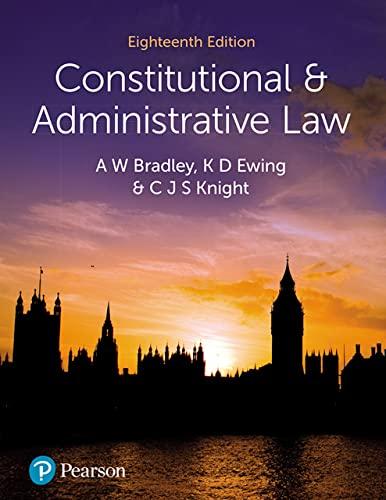Question
O'Brien v. Ohio State University 2007 Ohio App. LEXIS 4316 (Sept. 20, 2007) Case Facts In 1997, plaintiff O'Brien was hired as the men's basketball
O'Brien v. Ohio State University
2007 Ohio App. LEXIS 4316 (Sept. 20, 2007)
Case Facts
In 1997, plaintiff O'Brien was hired as the men's basketball coach at the defendant university. On May 14, 1998, Alex Radojevic, a talented basketball player from Yugoslavia, arrived on campus for an unofficial visit. At the time of the visit Radojevic was enrolled at a community college in Kansas and was playing basket- ball for that community college.
In the fall of 1998, O'Brien learned that Radojevic had played professional basketball for a Yugoslavian team. At trial O'Brien testified that he believed Radojevic was not eligible to play college basketball since he had played professionally. How- ever, O'Brien's staff continued to recruit Radojevic, and on November 11, 1998, Radojevic signed a National Letter of Intent with Ohio State and came for his official visit to the university in December 1998.
Later in December 1998, O'Brien was asked to provide some financial assistance to the Radojevic family, and O'Brien gave the family $6,000 from a drawer in his office desk. Plaintiff testified that he was certain that this "loan" did not vio- late NCAA rules since Radojevic was not able to be a college player.
Thereafter, however, in February 1999, when the defendant's athletic direc- tor, Andy Geiger, asked the plaintiff about Radojevic's status, O'Brien stated that he believed that Radojevic could regain his amateur status. Geiger had no knowledge of the loan to Radojevic. Radojevic never enrolled at Ohio State. He entered the NBA draft and was drafted by the Toronto Raptors.
In March 1999, O'Brien completed a very successful season with the team, advancing to the Final Four in the NCAA Tournament. Based on this performance Ohio State rewarded plaintiff with a new employment contract, with a substantial increase in compensation, effective September 12, 1999. On September 15, 1999, O'Brien signed an NCAA Certificate of Compliance certifying that during the 1998-1999 academic year he had "reported through the appropriate individuals any knowledge of violations of NCAA legislation involving [the] institution."
In April 2004, the plaintiff informed Geiger of the loan because the plaintiff knew that a lawsuit had been filed in which the loan would be revealed. After an internal investigation of this matter, the plaintiff was terminated in June 2004. The termination was a "for cause" termination, and the defendant alleged that the plaintiff had violated Section 4.1(d) of his employment contract, which required him to "know, recognize, and comply" with all applicable rules and regulations of the NCAA and to "immediately report to the Director [of Athletics] and to the Department of Athletics Compliance Office" if he had "reasonable cause to believe that any person had violated such laws, policies or regulations." The defendant university took the position that O'Brien's failure to report the loan made to Radojevic violated the above section and was a material breach of contract for which the university could terminate the contract for cause under Section 5.1(a), which stated that the university can terminate a contract if a material breach occurs. Section 5.1(b) was not mentioned as a reason for termination, but the language of that section referred to a rules violation committed by a coach that leads to a "major" infraction investigation by the NCAA or the Big 10 Conference. Defendant university received a notice from the NCAA that it was investigating the men's basketball program in May 2005. Three of the violations cited by the NCAA pertained to the Radojevic loan.
The plaintiff alleged that the university breached his employment contract in terminating him for cause. A trial was held in the Ohio Court of Claims, and the Court of Claims rendered judgment for O'Brien as it held that the university had breached the employment contract with plaintiff.
Holding
The Ohio Court of Appeals affirmed.
Rationale
The Court of Claims judge, who served as the fact finder, found that O'Brien made the loan for humanitarian reasons. He also found that Radojevic was ineligible to participate in athletics at the time that the loan was made even though O'Brien had continued to recruit Radojevic after learning that he had played professional basketball in Yugoslavia.
- The Court of Claims judge in this case interpreted the facts in favor of O'Brien when the judge characterized the loan as given for humanitarian reason and not given to gain an improper recruiting advantage. What facts might support a more sinister interpretation of the coach's conduct?
- Discuss how Ohio State could have strengthened its grounds for termination for cause.
- Discuss the implications of this decision relative to other colleges that may wish to terminate coaches "for cause."
- Review the Greenberg articleLinks to an external site. and consider the language of other termination provisions in coaches' contracts to determine how a termination clause may be written which favors the university. You may also consider the termination clauses
Step by Step Solution
There are 3 Steps involved in it
Step: 1

Get Instant Access to Expert-Tailored Solutions
See step-by-step solutions with expert insights and AI powered tools for academic success
Step: 2

Step: 3

Ace Your Homework with AI
Get the answers you need in no time with our AI-driven, step-by-step assistance
Get Started


